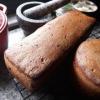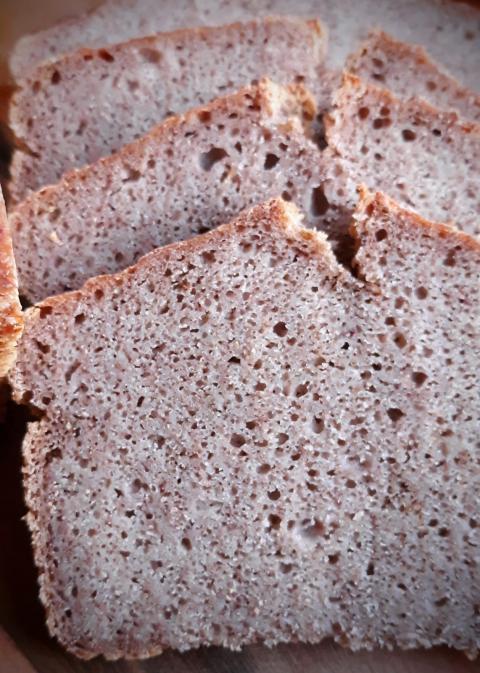
100% buckwheat bread

This was made out of whole unroasted buckwheat groats, soaked and inoculated with a pinch of rye starter. Fermentation was fast and extremely vigorous. Buckwheat groats are quick to fermented on their own, but they develop really bad stink in the process. With the help of the mature rye starter they smelled really rather nice.
Fermented groats were blended into dough. I added some coriander and caraway, and, obviously, salt.
The mixture was poured into prepared pan. Final proof was a little too short and resulted in cracks on the surface, but it was late and I wanted to bake and go to sleep.
The texture of this bread is really nice, with a feel of "melt in your mouth". Taste is very good, mild and pleasantly acidic, with notes of of spices that were used in the process. The taste of buckwheat is present, but not not overpowering.



Comments
Astonishing to get such a crumb from 100% buckwheat! Reading this makes me glad I just ordered some more buckwheat, though as flour not groats.
By "Fermented groats were blended into dough", do you mean actually pureed in a blender? It sounds like it ended up like a batter, is that right?
I'm speculating that the rye starter provided enough acid to prevent growth of stinky bacteria. If so, vinegar or another acid might do the same thing. Something more for me to experiment with, I guess.
Thanks for such an unconventional and good-looking bake.
TomP
This idea was floating on the internet (you tube included) for years. I found it on a Polish gluten free website.
Yes, you use blender to make this batter like dough.
I made it before without starter and the smell was weird, a little like bitter almonds with bacterial overtones. It wasn't as horrible as when one ferments a potato to make Appalachian salt rising bread. The smell went away in the oven, and bread was very tasty. For gluten free starter I would definitely use oats, their spontaneous fermentation is just so vigorous and healthy.
I saw people make similar bread with millet. It's on my list to try out.
That's an amazing looking bread. I never would have guessed that was made with 100% buckwheat. It looks more like a rye bread.
Do you think it would be possible to make with whole buckwheat flour? I can buy the flour much cheaper than the whole groats.
Yes, it does look and feel like rye. I made bread with 100% buckwheat only once and personally, I prefer this. Flour bread was heavier and you could feel something sandy in it. Family ate it without complaints, though.
BUCKWHEAT BREAD COMMUNITY BAKE sponsored by Abe was done last year and generated some fine recipes. Just enter "Buckwgeat" or Buckwheat,Abe" in the search box.
Thanks! I had forgotten that there was a CB for buckwheat. I'll check it out.
I do find it weird that I can buy imported buckwheat flour from a Serbian grocery for less than half what I would pay for whole raw groats. Hence, my desire to use flour.
Agreed! I think naturally fermented buckwheat made from buckwheat groats makes the best bread. The flour lacks something the whole buckwheat brings to the final loaf as regards to the texture. That's why my last few bakes have been trying to perfect the flour version. Still have some way to go to bring it on par with the whole buckwheat groats.
The method I have for this technique is to wash the groats, soak, blend and then mix in 2% salt into the blended buckwheat. This does not prevent a spontaneous ferment but does reduce any unwanted fermentation from less than desired microbes. Never get any "interesting" smells coming for the fermenting mixture. But as you have said, even if one does get an "weird" smell, it's not exactly "off" just more grassy. Unexpected as supposed to being bad and it disappears when baked. Once the batter has fermented i'll normally fold in some seeds.
Very nice bake.
I wonder if the same method would work for wheat or rye kernels.
TomP
And i settled upon - if it would work then it would have been done already. I'm not sure on the reasoning why it's not done like this for other types of [gluten] grain but i've convinced myself there are two possible reasons.
1: Buckwheat ferments very easily and there's more assured success.
2: Because there's no gluten in buckwheat these batter breads work better.
However i'm not really sure why this method can't work for gluten grains (there are other similar methods for other non gluten grains where spontaneous ferments are used to make breads).
EDIT: We see in gluten breads the stronger the gluten the longer the ferment. Perhaps gluten, and it's strength, plays a major role in the ferment therefore making it unsuitable for these spontaneous fermentable breads. There is one similar bread using wheat - salt rising bread - but it's a different process to sourdough. It uses bad bacteria and a very liquid batter.
I've seen it done with wheat. Produces dense, but nice looking bread. The soaked grains weren't blended but ground in the meat grinder.
I made it before with sunflower seeds, delicious.